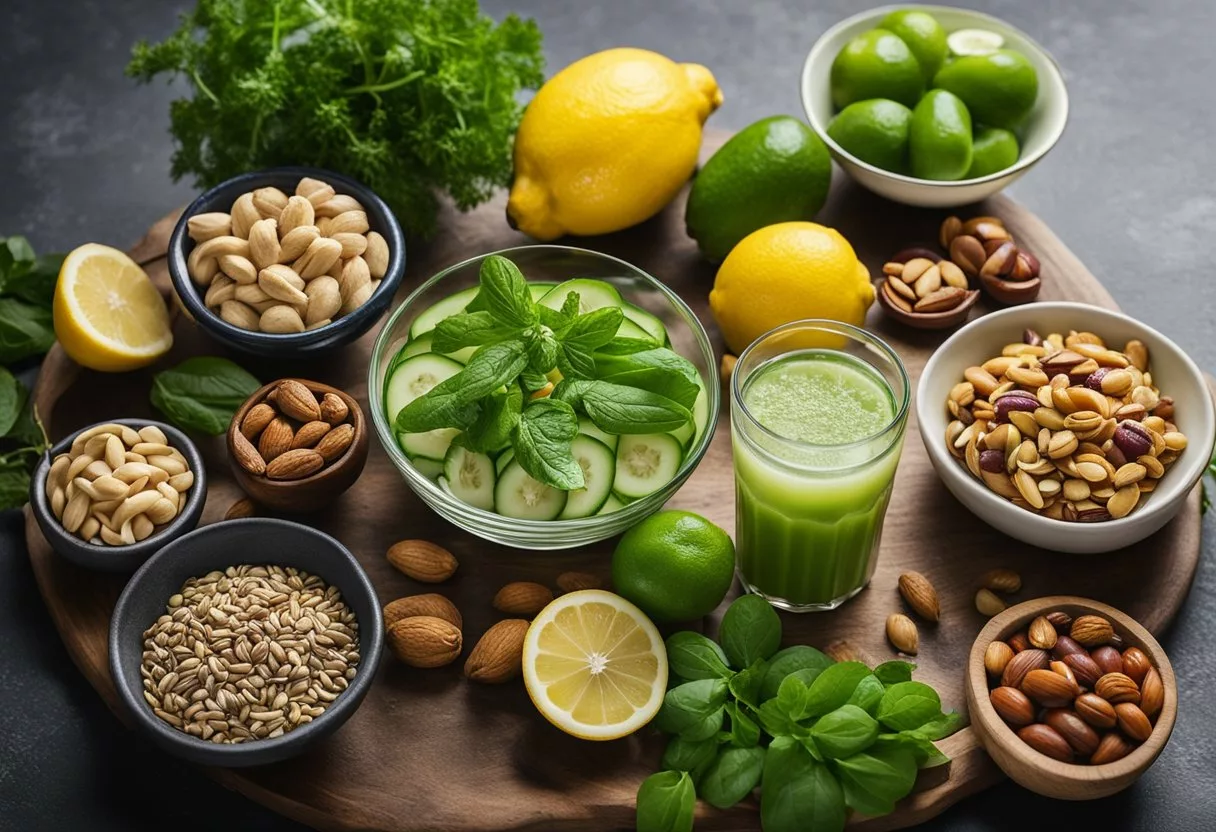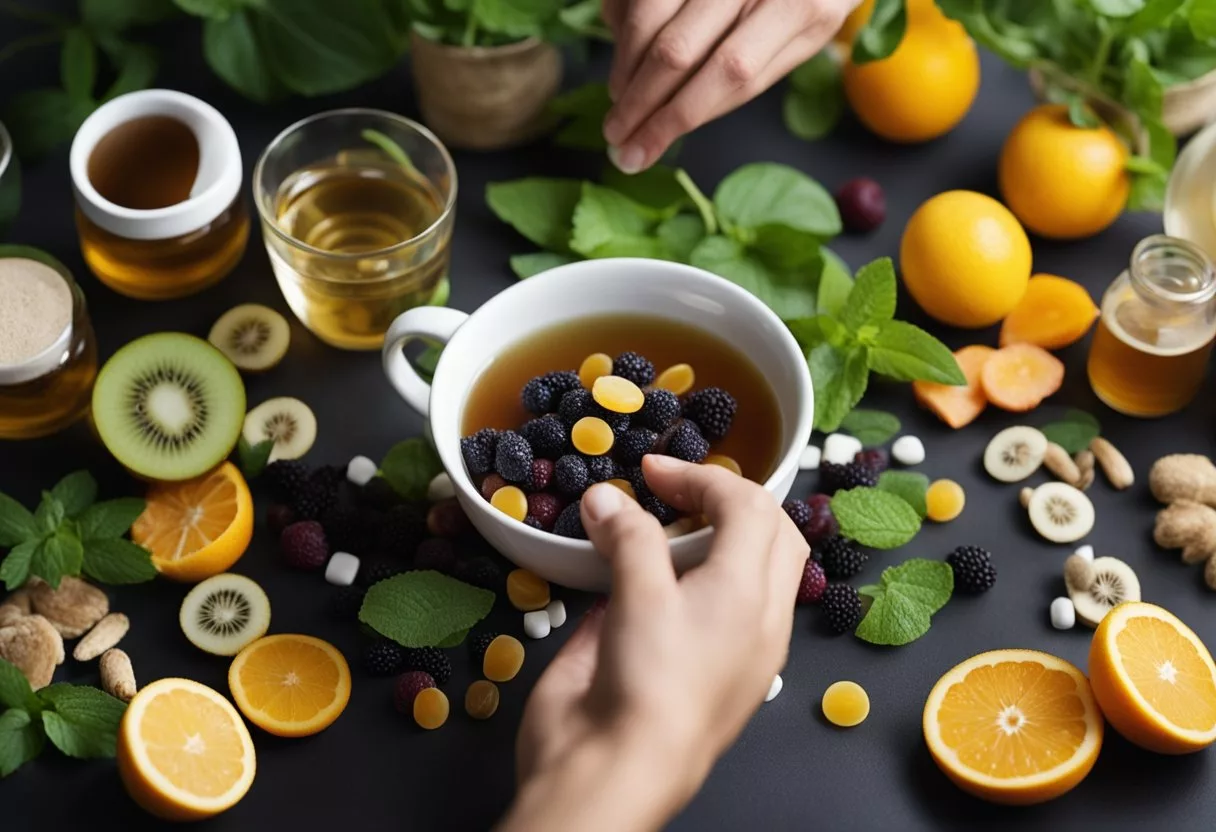Feeling sluggish and weighed down? You might be considering a detox. To detox your body naturally, focus on simple lifestyle changes that support your body’s natural detoxification systems. These changes include limiting alcohol, ensuring adequate sleep, drinking plenty of water, and eating antioxidant-rich foods.

Many people believe that special diets or expensive supplements are needed for a detox, but this is not the case. Simple actions like adding more fruits and vegetables to your diet, staying physically active, and avoiding processed foods can significantly aid in detoxification.
Understanding the natural detox processes of the body can improve health and, in some cases, help address symptoms of toxin overload. By supporting the body’s natural detox pathways, you can promote better overall well-being and feel revitalized.
Key Takeaways
- Natural detox does not require special diets or supplements.
- Simple lifestyle changes can support the body’s detoxification processes.
- Avoiding processed foods and staying active are key to a successful detox.
Understanding Detoxification

Detoxification is a natural process the body uses to remove toxins. Key organs in this process are the liver, kidneys, skin, lungs, and digestive system.
Liver Function The liver plays a major role in detoxifying the blood. It filters out harmful substances and transforms them into less harmful compounds that the body can expel.
Kidneys The kidneys filter the blood to remove waste products and extra fluids. They help maintain a balance of electrolytes and other essential substances.
Skin The skin can also eliminate toxins through sweat. Regular exercise and activities that promote sweating can aid the detoxification process.
Lungs The lungs expel toxins through exhalation. Regular breathing exercises and avoiding polluted environments support their detox function.
Digestive System A healthy digestive system effectively breaks down food, absorbs nutrients, and removes waste. Eating a diet rich in prebiotics can support digestive health.
Common Detox Methods
- Healthy diet: Eat nutrient-rich foods such as fruits, vegetables, and whole grains.
- Hydration: Drink plenty of water to help flush out toxins.
- Detox diets: Some people follow detox diets, but it’s essential to focus on balanced nutrition rather than extreme measures.
- Supplements: Probiotics and superfood green mixes can support natural detox processes.
Health Benefits
Adopting habits that support detoxification can improve overall health. Clear skin, better digestion, and improved energy levels are just some potential benefits. It’s important to approach detoxification naturally and maintain healthy lifestyle choices.
For more detailed tips on detoxification, visit the American Hospital Association or read about 9 Ways to Rejuvenate Your Body.
Nutritional Strategies for Detox

Detoxifying your body involves making dietary changes, hydrating properly, balancing your macros and micros, and choosing organic produce to reduce toxin intake.
Incorporating Detox-Supportive Foods
Eating foods that support detoxification can boost your body’s natural ability to cleanse itself. High-fiber foods such as vegetables, fruits, nuts, and seeds aid digestion and help to remove toxins from the body. Antioxidant-rich foods like berries, citrus fruits, and green tea protect the body’s cells from damage. Consuming a variety of these foods ensures that the detox pathways in the liver and kidneys are functioning properly.
Including herbs and spices like turmeric and ginger can also support detox processes. These ingredients have anti-inflammatory and antioxidant properties, aiding in the reduction of bodily stressors that may inhibit the body’s detox capabilities.
Staying Hydrated
Drinking enough water is crucial for detoxification. Water helps in flushing out toxins through urine, sweat, and bowel movements. It’s recommended to drink at least half your body weight in ounces of water daily, which helps in maintaining hydration levels and supporting kidney function.
Additions like lemon slices or herbal teas can make hydration more enjoyable and can provide additional benefits. For example, green tea is known for its antioxidants that support liver function. Staying hydrated can also help reduce hunger sensations and improve energy levels, aiding in overall bodily function.
Understanding Macros and Micros
Balancing macronutrients (proteins, fats, and carbohydrates) and micronutrients (vitamins and minerals) is essential for effective detoxification. Protein sources like lean meats, beans, and legumes provide amino acids crucial for liver detox enzymes. Healthy fats from sources such as avocados, nuts, and seeds are needed for cell membrane health and nutrient absorption.
Micronutrients like vitamin C, found in fruits like oranges and kiwis, and magnesium, found in leafy greens and nuts, play vital roles in detox processes. A diet rich in these nutrients helps maintain the systems that process and excrete toxins. Supplements can sometimes be beneficial, but whole foods should be the primary source.
Benefits of Organic Produce
Choosing organic fruits and vegetables helps minimize your intake of pesticides and other chemicals that can inhibit detoxification. Organic produce tends to have higher levels of antioxidants compared to conventionally grown options. These antioxidants help neutralize free radicals and other toxins in the body.
When buying organic isn’t possible, prioritize items like apples, strawberries, and spinach, which are often higher in pesticide residues. Removing these toxins from your diet reduces the burden on your liver and kidneys, making them more effective at detoxifying other substances.
Eating a diet rich in organic produce supports a cleaner, more toxin-free lifestyle, essential for maintaining optimal health.
Lifestyle Adjustments for Enhanced Detox

Making simple lifestyle changes can significantly improve detoxification processes. Quality sleep, regular physical exercise, and effective stress management techniques are essential.
Quality Sleep
Quality sleep is crucial for the body’s detoxification. During sleep, the brain clears out toxins that have accumulated throughout the day. For optimal results, aim for 7-9 hours of uninterrupted sleep each night.
A consistent sleep schedule helps regulate the body’s internal clock. To enhance sleep quality, create a bedtime routine that includes relaxing activities like reading or taking a warm bath. Avoid screens and stimulants like caffeine close to bedtime, as they can disrupt sleep patterns.
A dark, cool, and quiet sleeping environment is also important. Use blackout curtains or an eye mask to block light and a white noise machine to mask disturbing sounds. These adjustments can lead to better sleep and, consequently, improved detoxification.
Regular Physical Exercise
Regular physical exercise aids in detoxification through sweating and increased circulation. Engaging in activities like jogging, swimming, or cycling helps the body eliminate toxins through sweat. Aim for at least 30 minutes of moderate exercise most days of the week.
Strength training exercises also support detox by building muscle, which boosts metabolism and aids in fat loss. Activities like lifting weights or using resistance bands can help.
Incorporating high-intensity interval training (HIIT) can be particularly effective. HIIT involves short bursts of intense exercise followed by rest periods, which help in burning calories and improving cardiovascular health.
Additionally, practices such as yoga and stretching improve flexibility and relaxation, contributing to overall well-being.
Stress Management Techniques
Managing stress effectively is vital for detoxification. Chronic stress can hinder the body’s ability to detoxify. Techniques such as meditation and mindfulness help reduce stress by promoting relaxation and mental clarity.
Breathing exercises are a simple yet powerful stress management tool. Techniques like diaphragmatic breathing or alternate nostril breathing can calm the nervous system and reduce stress levels.
Regular practices of relaxation, like progressive muscle relaxation or guided imagery, can also be beneficial. Taking time to engage in hobbies, spending time outdoors, and practicing gratitude can further reduce stress.
Incorporating these stress management techniques can improve mental and physical health, aiding the detoxification process significantly.
Avoidance of Toxins

To keep your body free from harmful substances, it is crucial to minimize exposure to pollutants and limit the intake of harmful substances. These steps help reduce the burden of toxins, heavy metals, and chemicals on your body.
Reducing Exposure to Pollutants
Daily exposure to pollutants can be harmful. Many pollutants come from sources like air, water, and household products. Reducing exposure can involve simple changes.
Use air filters at home to lower indoor pollution. This helps remove dust, pollen, and even certain chemicals from the air. Ensure your home has proper ventilation. Regularly clean and maintain HVAC systems.
When it comes to water, using water filters can help remove contaminants like lead and mercury. Bottled water sometimes contains microplastics, so it’s best to use filtered tap water.
Select personal care products carefully. Many contain chemicals like parabens and phthalates. Opt for natural products free from toxic ingredients. Avoid using plastics for food storage or heating as they can leach chemicals into your food.
Limiting Intake of Harmful Substances
Certain dietary and lifestyle habits can increase your body’s toxin load. Processed foods often contain additives, preservatives, and high levels of sugar and salt. Eating fresh, whole foods is preferable.
Minimize consumption of alcohol as it taxes the liver. The liver is a key detox organ, and reducing alcohol intake helps it function better. Smoking introduces a range of toxins and free radicals into the body, so quitting is beneficial.
Avoid foods high in heavy metals like certain fish that may contain mercury. Clear choices are essential to prevent overloading the body with harmful substances. Maintain a balanced diet rich in antioxidants to help neutralize free radicals and support detoxification.
Supporting Natural Detox Pathways

Supporting the body’s natural detoxification involves boosting liver health, aiding the kidneys, promoting healthy skin, and cleansing the respiratory system. Each organ plays a crucial role in maintaining overall health by eliminating toxins.
Boosting Liver Health
The liver is essential for detoxification. It breaks down harmful substances and produces bile to help expel them. To enhance liver function, consume foods rich in antioxidants, such as leafy greens, berries, and nuts. The liver also benefits from regular intake of glutathione, a potent antioxidant found in avocados, spinach, and tomatoes.
Drinking plenty of water and limiting alcohol can prevent liver strain. Including turmeric and garlic in your diet can also support liver health. Protecting this organ is vital for an effective natural detox system.
Aiding the Kidneys
The kidneys filter blood and remove waste through urine. Staying hydrated is key to keeping the kidneys functioning properly. Aim for at least eight glasses of water a day. Foods rich in potassium, like bananas and sweet potatoes, can support kidney health.
Avoiding excessive salt and processed foods will also help the kidneys. Cranberry juice can prevent urinary tract infections, benefiting overall kidney function. Regular exercise can boost circulation and enhance kidney efficiency.
Promoting Healthy Skin
The skin is the body’s largest organ and plays a major role in detoxification through sweating. To keep your skin healthy, drink plenty of water and eat foods high in vitamins A, C, and E. These vitamins help maintain skin elasticity and combat free radicals.
Regularly engaging in physical activities like yoga or jogging can increase sweating, helping to expel toxins. Moisturizing and using sunscreen can protect the skin from drying out and UV damage, thus keeping it an effective part of your natural detox system.
Cleansing the Respiratory System
The lungs eliminate toxins through breathing. Deep breathing exercises can help cleanse the respiratory system by increasing oxygen intake and expelling carbon dioxide. Fresh air and avoiding polluted environments support lung health.
Incorporating antioxidant-rich foods, such as blueberries and oranges, can strengthen lung function. Regularly practicing activities like swimming or brisk walking can improve lung capacity and aid detoxification. Avoiding smoking and exposure to secondhand smoke is crucial to maintaining healthy lungs.
Symptoms and Indicators of Toxin Overload

Identifying the signs of toxin overload in the body is essential for maintaining good health. Various systems in the body may display symptoms when toxins accumulate.
Common Symptoms
- Fatigue: Persistent tiredness can indicate a buildup of toxins. Even after a full night’s sleep, one might feel exhausted.
- Headaches and Migraines: Frequent headaches may be linked to toxins like carbon monoxide and cyanide. These substances affect the brain’s blood flow.
- Inflammation: Joint pain and stiffness can signal inflammation caused by toxins. It can also manifest as swelling in different parts of the body.
Digestive Issues
Digestive problems often accompany toxin overload:
- Bloating: Unease and swelling in the stomach area are common when toxins interfere with digestion.
- Diarrhea and Constipation: The body may try to expel toxins through the digestive tract, leading to unusual bowel movements.
Respiratory and Nasal Symptoms
- Sneezing and Coughing: These can be the body’s way of clearing out harmful substances.
- Nasal Congestion: An increase in mucus production can cause a runny nose or congestion.
Skin and Emotional Indicators
- Skin Changes: Rashes, acne, and other skin issues may arise from toxins trying to escape through the skin.
- Mood Swings and Anxiety: Irritability and anxiety are emotional signs that toxins might be impacting the nervous system.
Other Indicators
- Muscle Aches: Unexplained muscle pain and aches can be due to toxins affecting tissues.
- Frequent Illness: A weakened immune system may result in more frequent infections and illness.
Understanding these symptoms can help in recognizing when the body needs a detox.
Supplemental Support for Detox

Supplements can play a key role in supporting your body’s detox process. Many options are available, each with its own benefits.
Milk Thistle is an herb known for supporting liver health. It helps protect liver cells and aid in their detoxification.
Chlorella, a type of algae, is commonly used in detox diets. It’s packed with nutrients and can help remove heavy metals from the body.
Fiber is essential for detoxification. It helps your body eliminate waste efficiently. Good sources include fruits, vegetables, and whole grains.
Incorporating antioxidants like vitamins C and E can help protect your body from damage caused by free radicals. These are molecules that can harm cells if their levels get too high.
Probiotics support gut health by promoting a balance of good bacteria. A healthy gut is vital for effective detoxification.
Foods like garlic can boost your body’s detox abilities. Garlic is known for its anti-inflammatory properties and ability to support liver function.
Consider adding enzymes to your routine. They help break down food and support overall digestion, aiding in the detox process.
Minerals like zinc and selenium are crucial for various detoxification processes in the body. They support enzyme functions that are necessary for detoxing.
Supplementing with anti-inflammatory products, including omega-3 fatty acids, can help reduce inflammation that might interfere with detoxification.
Using these detox supplements responsibly can support your body’s natural cleansing abilities. For more details, you can check out articles on the best vitamins and supplements for detox.
Understanding Detox Programs and Regimens

Detox programs and regimens claim to rid the body of harmful substances and improve overall health. They often involve specific foods, drinks, or supplements aimed at cleansing the body.
Common Detox Diets
- Juice cleanses: Drinking only fruit and vegetable juices.
- Elimination diets: Removing certain food groups to reduce toxin intake.
- Herbal cleanses: Using herbs like dandelion or turmeric.
Health Benefits
Detox programs may lead to short-term health benefits, such as weight loss and increased energy. By removing processed foods and sugars, these regimens can promote a more balanced diet and better digestion.
Potential Risks
It’s important to be aware of potential risks. Some detox diets can be quite restrictive and may lead to nutrient deficiencies if not carefully managed. It’s advisable to seek guidance from healthcare professionals before starting any program.
Balanced Diet and Hydration
Maintaining a balanced diet rich in fruits, vegetables, and whole grains supports natural detoxification processes. Staying hydrated is crucial, as water helps flush out toxins from the body.
Harmful Bacteria
Certain detox diets include foods that promote healthy gut bacteria, which can crowd out harmful bacteria. Foods like yogurt, kefir, and sauerkraut are common choices.
Research on Detox Programs
Research on the effectiveness of detox programs is mixed. Some studies suggest benefits, while others find limited evidence to support long-term health improvements. It’s essential to approach detox regimens with a critical eye and prioritize sustainable, healthy eating habits over quick fixes.
By focusing on these elements, individuals can better understand how detox programs and regimens work and their potential impact on health.
Monitoring Progress and Long-Term Maintenance

Tracking progress is essential in a detox journey. Keeping a journal or log helps monitor changes in energy levels, digestion, and skin health. Recording daily intake of water and foods can highlight patterns and improvements over time.
Regular check-ins with a healthcare professional can provide valuable insights. They can conduct tests to measure toxin levels and overall health markers, offering a clearer picture of one’s progress.
Maintaining a balanced diet rich in nutrients supports long-term detoxification. Foods like bananas, asparagus, garlic, and oats can promote a healthy digestive system. Drinking 8-10 glasses of water daily can help flush out toxins effectively.
Incorporating lifestyle habits that reduce toxin exposure is vital for sustainable health. Using air filters, choosing organically grown foods, and avoiding plastics can lessen the burden on the body’s detoxification system.
Listening to one’s body is crucial. Noticing signs like improved energy, better sleep, and clearer skin can indicate successful detoxification. It’s important to adjust the detox plan based on these observations for continued effectiveness.
Practicing consistency is key. Regular healthy habits, rather than sporadic efforts, ensure better long-term outcomes. This approach makes the detox journey manageable and effective over time.
By focusing on these steps, individuals can monitor their detox progress effectively and maintain their health in the long run.
Frequently Asked Questions

This section covers practical methods for bodily detoxification, quick detox tips, and specific benefits related to weight loss and smoking cessation.
What natural methods can I use to cleanse my body at home?
Natural methods include drinking plenty of water, eating fiber-rich fruits and vegetables, and getting regular exercise. Reducing processed foods and incorporating whole, nutrient-dense foods can also support your body’s natural detox processes.
What are effective ways to detoxify my body quickly?
To detox quickly, focus on staying hydrated and consuming antioxidant-rich foods like berries and leafy greens. Engaging in activities like sweating through exercise or visiting a sauna can help your body expel toxins faster.
What types of beverages can aid in detoxifying my system?
Beverages like green tea, lemon water, and unsweetened herbal teas are effective detox drinks. These can help flush out toxins and improve hydration. Additionally, limiting sugary drinks and alcohol can further support detoxification.
How can detoxification contribute to weight loss?
Detoxification can aid weight loss by reducing water retention and bloating. Eating a clean diet that eliminates processed foods and includes plenty of fruits, vegetables, and lean proteins can lead to healthier metabolism and improved digestion, which may support weight loss.
What methods are recommended to detox from smoking?
Quitting smoking requires eliminating nicotine from the body, which can be aided by drinking water, eating antioxidant-rich foods, and engaging in regular physical activity. Seeking support from health professionals and considering nicotine replacement therapy or other cessation programs can also be beneficial.
What signs indicate toxins are being expelled from the body during a detox?
Common signs of toxin expulsion include increased urination and sweating, improved skin clarity, and a feeling of increased energy. Some people may also experience temporary symptoms like headaches or fatigue as their bodies adjust to the detox process.